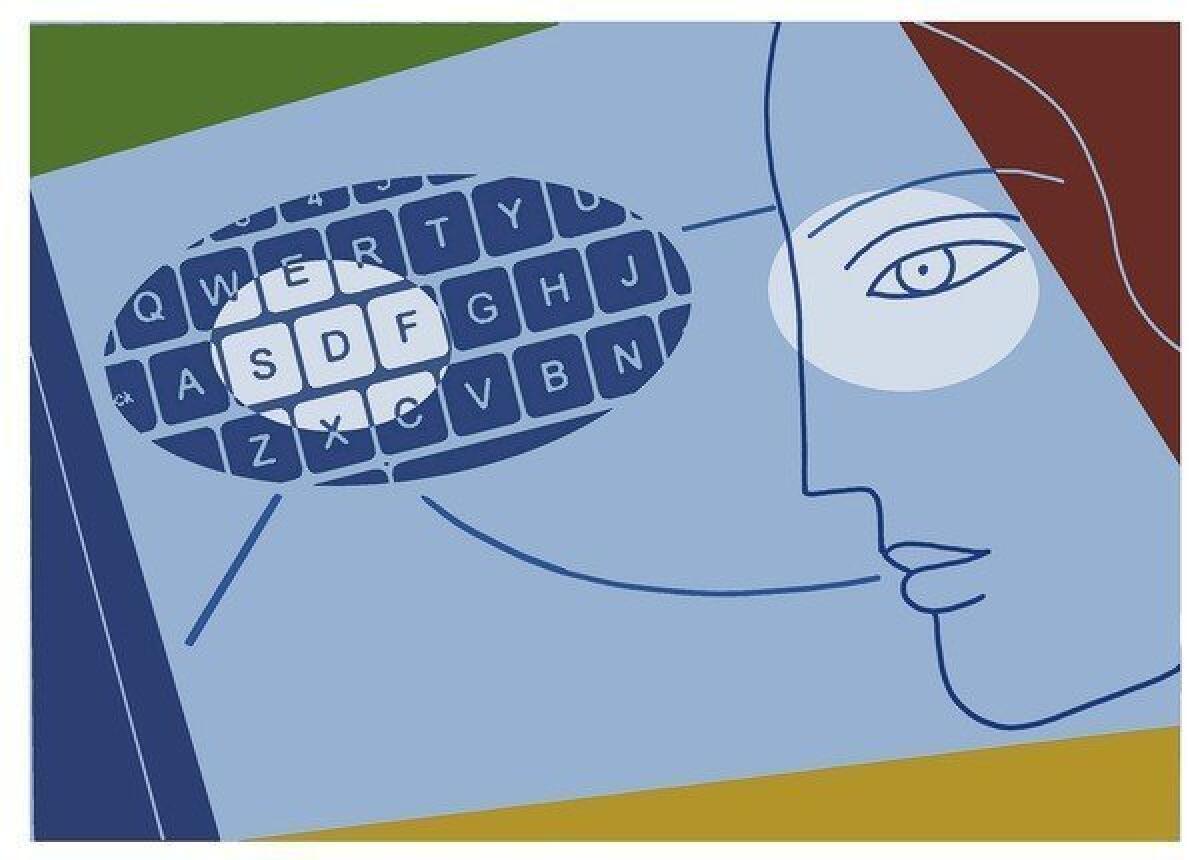Finding a voice for Eva

It occurred to me the other day that it is becoming less and less necessary to speak. Why talk when you can text, tweet or email? Why pick up the telephone when Facebook brings you up to date with every detail of your friends’ lives? It feels like the human voice is becoming irrelevant, and I’m thrilled about it. You see, I have a daughter who can’t speak.
When Eva, who is now in her late 20s, was 6 months old, we received the official diagnosis of cerebral palsy. It wasn’t a surprise. Her birth had become suddenly difficult, then dangerous — a rapidly falling heartbeat, a baby in severe distress, an emergency Cesarean. After watching over her anxiously for the three weeks she spent in the hospital’s neonatal intensive care unit, we were told to take our daughter home and “see how she develops.” We’d know soon enough what damage the lack of oxygen had wrought.
During those early, desperate months, my mind was preoccupied with disastrous scenarios. Would she ever sit up? Yes, it turned out. Would she walk, dress herself, eat by herself? No, none of those things, we realized as she grew.
It took me awhile to realize that I had left off my list of questions the most profound one: Would my beautiful baby ever be able to talk? It was impossible to imagine what kind of life she would have if she couldn’t. To me, no speech meant no communication. No communication meant no human connection. No human connection meant a life without joy. But I was wrong.
Through dumb luck, we found the UCLA Intervention Program for Handicapped Children, a preschool that was experimenting with ways disabled toddlers could use computers. Eva took to it instantly. Despite having only limited use of her hands, she could still hit a large lever connected to an Apple IIe and play a game or, to our astonishment, laboriously spell the word she wanted “to say.” She wasn’t even 3 and through the wonder of the computer she told us that she was smart, that somehow she had taught herself to read. There wasn’t a person on the planet who would have predicted that on the night of her birth.
As Eva grew, so did the technology. Next came the Unicorn Board, which takes the place of a computer’s keyboard. It is a large, touch-sensitive tablet that holds the alphabet. With the heel of her left fist, my determined daughter, thick blond ponytail swinging with every effort, would press the letters she wanted and simple sentences would appear on the screen. That’s when we’d get her gorgeous grin: Mom, I did it!
By the time she was 10, the effort required to use the Unicorn Board made sophisticated communication impossible. My husband, who had been forced by our circumstances to become a technology guru, found something called a HeadMouse, a way for Eva to use the computer with her head rather than her hands.
We put a small, reflective silver dot about the size of a pencil eraser on her forehead. It interfaces with an optical reader, set on top of the monitor, which tracks the dot and translates Eva’s head movements into the directly proportional movements of a regular mouse.
For any kind of writing, like email or texting, a tiny replica of a keyboard appears on the bottom of the screen and Eva selects each letter by moving her head and dwelling for a calibrated fraction of a second on the key she needs. The computer reads “click” and the letter instantly appears on the screen.
Over the years she has gotten so fast with this kind of “typing” that the person on the other end of her interaction has no way of knowing that she is doing anything besides using her fingers on a keyboard.
Now that most people spend so much time on their computers or iPads or smartphones inputting what they want to say letter by letter, it is as if the world has caught up with Eva’s communication style. That fact was brought home to me recently when Eva applied for a job.
The posting was online. She found it on Craigslist. Applicants were asked to submit writing samples along with their applications. She did that. This company is an Internet start-up and all communication was via the Web. Eva was applying just like everyone else. Her ability to write was the criterion on which they judged, not her ability to speak or walk into a room. And they had no idea, nor did they care, how she did that writing.
From the 300 people who applied, she was selected for a paid internship and was asked to come into the company offices to sign a contract and meet her co-workers. She showed me the news as it appeared in an email, thrilled, that glorious smile spread across her face.
The email gave me pause. All the technology that makes her life and her communication possible could do nothing to make such a meeting go well. I suggested that she explain a bit about her disability in a return email, that it would be better to give them a head’s-up before she rolled into the room in her wheelchair, her large male aide at her side. She drafted a note that told them how excited she was to get the job and that she wanted them to know that she uses a wheelchair. And also that she felt confident that her ability to do this job — writing — was not affected by her disability.
This is, in part, the response she got. “Eva, we hired you because of your ability, not your disability. Everyone’s disabled in some way. I think you will find this environment supportive and welcoming.”
I read the company’s response with tears filling my eyes. What it told me was that my daughter, who has never uttered a word in her life, had been heard.
Deena Goldstone is a screenwriter who lives in Pasadena.
More to Read
A cure for the common opinion
Get thought-provoking perspectives with our weekly newsletter.
You may occasionally receive promotional content from the Los Angeles Times.










